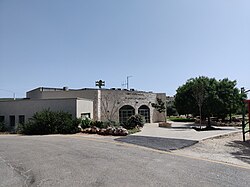Yair Farm
In this article, we will explore the various facets of Yair Farm, analyzing its impact on today's society and its relevance in different contexts. Yair Farm has been the subject of discussion and debate throughout history, being a topic of interest to a wide range of people, from experts in the field to the general public. Over the years, Yair Farm has evolved and adapted to the changing realities of the modern world, playing a fundamental role in the way we understand and confront various challenges. Through a detailed and exhaustive examination of Yair Farm, we seek to shed light on its less explored dimensions and offer new perspectives that enrich the debate around this topic.
Yair Farm
חוות יאיר | |
|---|---|
 Yair Farms Synagogue in 2021 | |
| Coordinates: 32°08′40″N 35°06′15″E / 32.144541°N 35.104086°E | |
| Country | Israel |
| Council | Shomron |
| Region | West Bank |
| Founded | 1999 |
| Website | havotyair |
Yair Farm (Hebrew: חוות יאיר, romanized: Havot Yair) is an Israeli settlement in the West Bank, built as an illegal outpost in 1999 and legalized in 2021 by the Israeli government.[1][2] Located near Nofim and Yakir, it falls under the jurisdiction of Shomron Regional Council. It is home to around 70 families.
The international community considers Israeli settlements in the West Bank illegal under international law, but the Israeli government disputes this.[3]
History
The village was first established in 1999 as an outpost and named after Avraham (Yair) Stern, leader of the pre-state underground militant group Lehi, though the community's website notes the name of Yair ben Menashe.[4] Although it was later evacuated, it was re-established in February 2001. According to Peace Now, the parent settlement of this outpost is Yakir and 17,666 square metres (190,160 sq ft) of the area that this outpost is built on is expropriated private Palestinian land.[5] The Sasson Report reported that the Israeli Ministry of Housing and Construction had allocated 1 million Israeli new shekels for the construction of several structures at the outpost.[6]
In January 2021, the outpost was regulated by the Israeli government, which declared it "a neighborhood of the Yakir settlement".[2]
References
- ^ Shragai, Nadav. Outposts / 'God giveth, God taketh away' Ha'aretz. 19 June 2006
- ^ a b "780 Settlement Housing Units Approved Ahead of US Presidential Transition". Peace Now. 17 January 2021.
- ^ "The Geneva Convention". BBC News. 10 December 2009. Retrieved 27 November 2010.
- ^ Gideon Levy, Outposts 2012: Coming to a West Bank hill near you, at Haaretz, 24 April 2012:" “Yair son of Menashe took all the region of Argob, unto the border of the Geshurites and the Maacathites, and called them, even Bashan, after his own name, Havot-Yair, unto this day” (Deuteronomy 3:14)."
- ^ Full outposts list Peace Now. Accessed 16 June 2011
- ^ Yair Farm Peace Now. Accessed 16 June 2011


